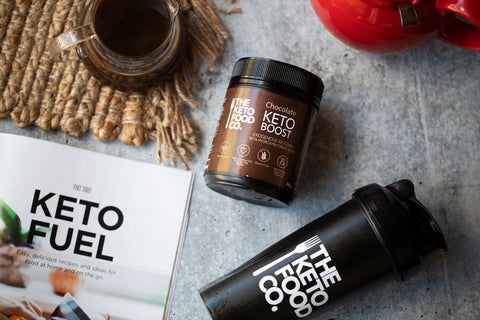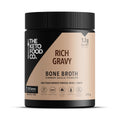Exogenous ketones: what are they?
Beta-hydroxybutyrate (BHB) is a ketone body produced in the liver naturally under conditions when glucose isn’t very available. Other types of ketones produced via the restriction of dietary carbohydrates are acetoacetate and acetone. A VLCHF (very low carb, high fat) or ketogenic diet provides the optimal conditions for this process. Fasting, exercise and/or basic caloric restriction are all also methods for promoting ketogenesis (literally, the making of ketones).
Ketones are an alternate energy or fuel source for brain and body that our bodies have naturally produced and used for millennia. Ketones have recently leapt to the forefront of health and wellness conversations worldwide as the scientific body of research that seeks to understand their numerous unique properties and profound systemic effects has begun to grow (see below).
Our mission at The Keto Food Co is to help educate and assist people in transitioning to a ketogenic way of eating for life. Primarily, we support people achieving this via adopting a VLCHF or ketogenic way of eating. Exogenous ketones can however play a useful role in transitioning to and maintaining a ketogenic lifestyle, and so we have exhaustively researched and developed a unique, “next level” ketone supplement that focuses specifically on optimizing health via the gut-brain axis.
What they’re not!
Exogenous ketones are not a magical fat-loss supplement, and to suggest otherwise is both factually incorrect and deliberately misleading. In fact, consuming ketones to excess can hinder rather than help fat loss! Aggressive marketing of exogenous BHB’s has helped to create a myth being believed now by millions – that simply drinking ketones each day will somehow magically melt away the pounds. The metabolic fact that unscrupulous marketers do not point out is that dietary fat (plate fat; or fat/ketones you ingest) will be burned before stored fat (body fat). So, whilst exogenous ketones can help you to mitigate hunger (and therefore help you achieve a caloric deficit) – and although they also have many other benefits (detailed below); they are not a magic wand that you can wave to achieve weight or fat loss and should not be marketed as such.
What are the benefits of BHB?
A recent review published in Neurochemistry (2017) highlighted some of the known benefits of ketones in the brain, which include but are not limited to:
- Enhanced mitochondrial respiration
- Increased brain-derived neurotropic factor (BDNF)
- Reduced brain inflammation
- Reduced oxidative stress
- Strengthened synaptic signalling
Thus we may conclude that ketones are an excellent source of fuel for the brain. But what about for body?
Both anecdotal reports and clinical data suggest that ketones may confer a myriad of physiological benefits:
- Improved cognition and mental performance (focus, clarity, lifting of ‘brain fog’, decision-making)
- Less or more manageable hunger
- Reduced cravings for sugar and carbs
- Longer lasting, clean-burning energy
- Prevention of “keto flu” (also known as carb flu)
But why take a BHB supplement if you’re on a ketogenic diet?
If you have already mastered the Very Low Carbohydrate (VLC) or ketogenic way of eating, and/or are eating at a caloric deficit, exercising or fasting you are naturally creating the optimal conditions for your body to produce ketones and put your body into nutritional ketosis. By strict adherence to a well-formulated ketogenic diet (complete with higher levels of mineral salts) you should be able to produce all the ketones you need naturally (endogenously). If you are new or inexperienced in ketogenic eating however; or if you or a family member struggles to adhere to a ketogenic diet, then supplementation with exogenous ketones may be very beneficial. Not only will ketone supplements help to mitigate hunger and carb cravings, but they will also help you stave off carb flu symptoms (see below), giving you the best possible chance of long-term success.
Finally, exogenous ketones may be of great help to people who are specifically seeking cognitive and/or emotional (mood) benefits. Whilst there is still much research to be done, there are considerable well-documented brain benefits as outlined in the scientific literature (references below).
So who should take them?
Supplemental BHB’s are ideal for people new to the ketogenic way of eating. The changes that happen in your brain and body when adapting to a VLC diet are both immediate and profound. For example, our kidney’s start processing minerals salts much more efficiently. Ironically, after years of being advised to decrease our intake of salt (sodium), it turns out that for people transitioning away from the Standard American Diet (SAD diet) towards a lower carb or ketogenic diet there is actually a need to increase dietary mineral salts such as potassium, sodium, magnesium and calcium. During the process of becoming keto-adapted, it is very important to increase your intake of these essential minerals, in order to prevent the onset of unpleasant symptoms (known as “keto flu”).
What is keto flu?
Also known as the carb flu, the keto flu is commonly experienced by people who are transitioning to a Ketogenic diet. “Keto flu” is not actually flu but mimics the experience of flu with very similar symptoms. It can happen when someone who has become accustomed to relying primarily on carbohydrates as fuel removes them from their diet. Whilst this is a necessary step towards adjusting from being a sugar-burner to a fat-burner, the sudden change can trigger some unpleasant symptoms, much like withdrawing from an addictive substance. Keto flu symptoms can include drowsiness, nausea, dizziness, achy muscles, mental fogginess and an irritable mood. The good news though, is that most of these experiences relate to dehydration and electrolyte depletion, and so are easily prevented or managed. Simply adding a ¼ - ½ teaspoon of a high quality sea salt or sodium/potassium powder to a glass of water works wonders; however you may still require a separate magnesium supplement; particularly if you are prone to muscle cramps or restless legs. Another popular way to manage your electrolytes is via a good quality bone broth powder. Finally, since BHB’s are normally delivered via a mineral salt base*, keto flu symptoms are easily prevented or reduced by using an exogenous ketone supplement powder.
*(the exception being BHB esters, which are hugely expensive, hard to find and exceptionally challenging from a taste perspective)
Who shouldn’t take them?
Ketones naturally exist in the body, being created during the process of fat metabolism and are therefore safe to consume even during pregnancy or breastfeeding. Supplements such as our Keto Boost are simply providing ketones from an external (exogenous means literally ‘outside of the body’) source. However, if you suffer from any medical conditions and/or are on medications, it is always advisable to consult your health care provider prior to starting any new nutritional or dietary supplement.
When should BHB supplements be taken?
Supplemental BHB’s can be taken at any time, however for the most impactful results, many people choose to take them in the absence of food (either first thing in the morning or in-between meals in place of a snack).
Scientific references:
Brehm BJ, et al. A randomized trial comparing a very low carbohydrate diet and a calorie-restricted low fat diet on body weight and cardiovascular risk factors in healthy women. The Journal of Clinical Endocrinology & Metabolism, 2003. https://www.ncbi.nlm.nih.gov/pubmed/12679447
McClernon FJ, et al. The effects of a low-carbohydrate ketogenic diet and a low-fat diet on mood, hunger, and other self-reported symptoms. Obesity (Silver Spring), 2007. https://www.ncbi.nlm.nih.gov/pubmed/17228046
Scott J. Koppel, Russell H. Swerdlow. “Neuroketotherapeutics: A modern review of a century-old therapy.” Neurochemistry International, 2017.
Stafstrom CE and Rho JM. “The ketogenic diet as a treatment paradigm for diverse neurological disorders.” Frontiers in Pharmacology 2012; 3(59).
Westman EC, et al. The effect of a low-carbohydrate, ketogenic diet versus a low-glycemic index diet on glycemic control in type 2 diabetes mellitus. Nutrition & Metabolism (London), 2008. https://www.ncbi.nlm.nih.gov/pmc/articles/PMC2633336/
Yancy WS Jr, et al. A low-carbohydrate, ketogenic diet versus a low-fat diet to treat obesity and hyperlipidemia. Annals of Internal Medicine, 2004. https://www.ncbi.nlm.nih.gov/pubmed/15148063





Comments (0)
There are no comments for this article. Be the first one to leave a message!